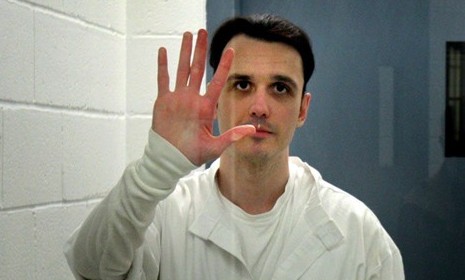The 'dramatic' release of the West Memphis Three: An instant guide
After serving 18 years in prison for allegedly killing three Boy Scouts, three Arkansas men are unexpectedly granted freedom Friday during a surprise hearing

A free daily email with the biggest news stories of the day – and the best features from TheWeek.com
You are now subscribed
Your newsletter sign-up was successful
After spending 18 years in prison for the horrific murders of three eight-year-old Boy Scouts, the "West Memphis Three" — Damien Echols, Jason Baldwin, and Jessie Misskelley — were released from custody today. The surprise, "dramatic" release of the men, the subject of national headlines and several award-winning documentaries, is being celebrated by those who followed the nearly two-decade saga. Here, a guide:
Who are the West Memphis Three?
Echols, Baldwin, and Misskelley were 19, 16, and 17, respectively, when they were convicted of killing three boys who were found "naked, beaten, and hogtied in a drainage ditch" in an area of West Memphis, Ark., known as Robin Hood Hills, says Anne-Marie Dorning at ABC News. The boys had been sexually abused and one was partially castrated. Echols, "a troubled yet gifted teenager who practiced Wicca," was thought to be the group's ringleader and was given the death sentence, says Campbell Robertson at The New York Times. Baldwin and Misskelley were sentenced to life in prison, plus 40 years.
The Week
Escape your echo chamber. Get the facts behind the news, plus analysis from multiple perspectives.

Sign up for The Week's Free Newsletters
From our morning news briefing to a weekly Good News Newsletter, get the best of The Week delivered directly to your inbox.
From our morning news briefing to a weekly Good News Newsletter, get the best of The Week delivered directly to your inbox.
And their conviction was questioned?
The "grotesque nature of the murders" led to a theory that satanic cult activity was involved in the crime, further implicating Echols and his two teenage friends, says Campbell. Beyond that, "virtually the only evidence" prosecutors had was an immediately recanted confession by Misskelley, who is reportedly borderline mentally retarded, says Linda Holmes at NPR. During a Supreme Court of Arkansas appeal in 1996, a judge noted that the confession had "a confusing amalgam of times and events" and didn't match up with the physical evidence in the case. Nonetheless, the conviction was upheld. A passionate segment of people believed that the West Memphis Three were wrongfully convicted for being "weird" in a town where "fears whipped up" at the mention of Wicca and Satanism.
Why are they so famous?
In 1996, HBO commissioned an HBO documentary about the killings titled Paradise Lost: The Child Murders at Robin Hood Hills. The film and its sequel, Paradise Lost 2: Revelations, argued that the three were wrongly convicted. The West Memphis Three have since become a cause célèbre for prominent Hollywood actors and musicians. Johnny Depp defended them in an interview with 48 Hours Mystery, says Mandi Bierly at Entertainment Weekly, and joined Eddie Vedder, the Dixie Chicks' Natalie Maines, and Patti Smith at an August rally in support of the men. Peter Jackson and his wife Fran Walsh reportedly funded a private investigation into the case as well, according to Deadline. A third Paradise Lost documentary will premiere at this year's Toronto Film Festival; its filmmakers were in attendance at Friday's release hearing.
A free daily email with the biggest news stories of the day – and the best features from TheWeek.com
What led the early release?
Skepticism of the trio's guilt grew in 2007 when new DNA evidence was brought forward that did not link any of the men to the scene of the crime. Even some family members of the victims began crusading for their innocence. "They're innocent," said John Mark Byers, the father of one of the murdered boys, on Friday. "They did not kill my son."
Were they exonerated?
The plea bargain that the trio struck actually does not exonerate them, even though their DNA was not found at the scene, says Holmes. Under what's called an Alford plea, the three are allowed to maintain their innocence, but must acknowledge that the prosecutors have enough evidence to convict them.
Are they satisfied with this outcome?
"It's not perfect," says Echols, speaking at a press conference after the hearing. "But it at least brings closure to some areas." He added that he will still try to clear their names, "the only difference is now we can do it from the outside."
Sources: ABC News, Deadline, Entertainment Weekly, NPR, NY Times, TIME
-
 Why is the Trump administration talking about ‘Western civilization’?
Why is the Trump administration talking about ‘Western civilization’?Talking Points Rubio says Europe, US bonded by religion and ancestry
-
 Quentin Deranque: a student’s death energizes the French far right
Quentin Deranque: a student’s death energizes the French far rightIN THE SPOTLIGHT Reactions to the violent killing of an ultraconservative activist offer a glimpse at the culture wars roiling France ahead of next year’s elections
-
 Secured vs. unsecured loans: how do they differ and which is better?
Secured vs. unsecured loans: how do they differ and which is better?the explainer They are distinguished by the level of risk and the inclusion of collateral